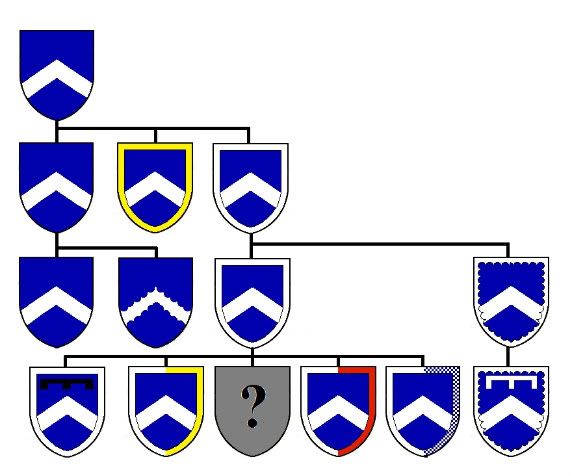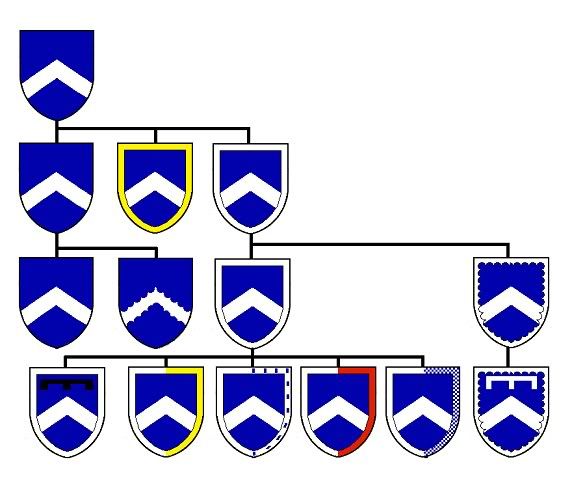|
-
2nd September 10, 04:31 PM
#11
I'm tempted to continue the exercise; though I decided I'd best wait until my new book arrives, as it will probably answer most (if not all) of my questions!
Thank you for the recommendation!
-
-
3rd September 10, 07:28 AM
#12
So the book is on order but coming from the UK, so it may be a while.
I know I said I was finished but this last (I promise!) question will bother me for the week and half before I can expect to be able to look it up.
Here's the last example:

In this case the bordure is argent and the field is azure, so the fifth son would have a bordure divided per pale argent, chequey argent and azure. What would be the convention for the third son? And if the third son's arms would be differenced as above, what would be the proper bordure for the fifth son?
What a complicated subject!
-
-
3rd September 10, 10:39 AM
#13
I would have to say that the bordure for the third son would be:
a bordure per pale Argent and compony counter-compony Argent and Azure. Lyon Clerk advised a friend of mine not too long ago that the bordure compony counter-compony would be granted to the son who had the same situation with tinctures as your hypothetical exercise does.
It is also possible that the current Lord Lyon isn't wedded to the Stoddard System of differencing cadet arms.
-
-
3rd September 10, 10:45 AM
#14
 Originally Posted by JSFMACLJR

I would have to say that the bordure for the third son would be:
a bordure per pale Argent and compony counter-compony Argent and Azure. Lyon Clerk advised a friend of mine not too long ago that the bordure compony counter-compony would be granted to the son who had the same situation with tinctures as your hypothetical exercise does.
It is also possible that the current Lord Lyon isn't wedded to the Stoddard System of differencing cadet arms.
That is very helpful, nonetheless! I should have thought of that as a possible solution... it never occurred to me to vary the number of checks in the bordure to show the difference.
Thank you, Sandy.
-
-
3rd September 10, 12:18 PM
#15
Where's my tabard when I need it?
 Originally Posted by Cygnus

So the book is on order but coming from the UK, so it may be a while.
I know I said I was finished but this last (I promise!) question will bother me for the week and half before I can expect to be able to look it up.
Here's the last example:

In this case the bordure is argent and the field is azure, so the fifth son would have a bordure divided per pale argent, chequey argent and azure. What would be the convention for the third son? And if the third son's arms would be differenced as above, what would be the proper bordure for the fifth son?
What a complicated subject!
Here we come to the one weakness in Mr. Stodart's wonderful system of cadency (actually there are several, but we won't worry about that for the moment). To quote Lord Lyon Sir James Balfour Paul on the subject:
The weak point of the Scottish system is that, whilst the general idea is good, there is no definite rule whereby it can be carried out on unchanging lines; much is left to the discretion of the authorities (ie: the Heralds).
So, what's a Herald to do? The ultimate decision is up to the granting authority, who, in consultation with the client, will make the ultimate determination. Were it me I would divide the bordure per pale argent and chequy argent and azure, and in the instance of the 5th son divide the bordure quarterly (1&4) argent and (2&3) chequy argent and azure.
The granting authority's heraldic mileage may vary. 
-
-
3rd September 10, 01:18 PM
#16
You Bastard!!!!!
 Originally Posted by JSFMACLJR

I would have to say that the bordure for the third son would be:
a bordure per pale Argent and compony counter-compony Argent and Azure. Lyon Clerk advised a friend of mine not too long ago that the bordure compony counter-compony would be granted to the son who had the same situation with tinctures as your hypothetical exercise does.
It is also possible that the current Lord Lyon isn't wedded to the Stoddard System of differencing cadet arms.
(No, not you Sandy  ) The bordure compony is often used in Scottish heraldry to denote illegitimacy, hence Lyon's reliance on compony counter-compony to resolve the issue. The difference between counter-compony and chequy is one row of alternating squares of colour and, in my view at least, really is not a satisfactory difference between siblings, hence my reluctance to offer it as a suggestion, and instead looked to the precedent provided by Lord Lyon Sir James Balfour Paul. ) The bordure compony is often used in Scottish heraldry to denote illegitimacy, hence Lyon's reliance on compony counter-compony to resolve the issue. The difference between counter-compony and chequy is one row of alternating squares of colour and, in my view at least, really is not a satisfactory difference between siblings, hence my reluctance to offer it as a suggestion, and instead looked to the precedent provided by Lord Lyon Sir James Balfour Paul.
For those still interested:
Stodart's system of cadency is not exclusively Scottish, and is used in applications outside of the court of the Lord Lyon. In Ireland, for example, where illegitimacy no longer exists in law (natural children having the same rights as those born of a lawful union or adopted into a family) the use of a bordure compony would have no significance other than to suggest the place of the child in relationship to his/her other siblings.
Last edited by MacMillan of Rathdown; 3rd September 10 at 09:45 PM.
-
-
3rd September 10, 01:32 PM
#17
Thinking ahead a generation, though, would Sandy's suggestion not be the better choice so that the next "set" of matriculants can use the quartered bordure without there being any confusion?
I admit that chequey and compony counter compony would be easily confused (especially on a battlefield, though that's not really the purpose of heraldry today), so it certainly wouldn't be ideal.
And I am most certainly still interested!
-
-
3rd September 10, 01:41 PM
#18
 Originally Posted by Detroitpete

WOW! That's all I can say gentleman. WOW!
What he said. I read the discussion with great interest, as a spectator to something very much beyond my ken. Thank you gentlemen!
"Before two notes of the theme were played, Colin knew it was Patrick Mor MacCrimmon's 'Lament for the Children'...Sad seven times--ah, Patrick MacCrimmon of the seven dead sons....'It's a hard tune, that', said old Angus. Hard on the piper; hard on them all; hard on the world." Butcher's Broom, by Neil Gunn, 1994 Walker & Co, NY, p. 397-8.
-
-
3rd September 10, 04:05 PM
#19
 Originally Posted by Cygnus

Thinking ahead a generation, though, would Sandy's suggestion not be the better choice so that the next "set" of matriculants can use the quartered bordure without there being any confusion?
I admit that chequey and compony counter compony would be easily confused (especially on a battlefield, though that's not really the purpose of heraldry today), so it certainly wouldn't be ideal.
And I am most certainly still interested!
Generally speaking, the next "generation" would probably difference by dividing the bordure per fess, and the generation following that one would divide per cross (quarterly). In all probability variations in the lines of partition would also be tossed in for the chevron, as well as for the bordure.
That said, Sandy's suggestion of a bordure compony counter-compony is probably the technically better choice, especially if the Herald failed to use all of the options available to him when composing the differencing of the coat of arms. In that same vein I think a bordure billettee argent and azure would probably be a better choice, although it may look like the dreaded compony at first glance. Bastard!

-
-
3rd September 10, 08:45 PM
#20
 Originally Posted by MacMillan of Rathdown

Generally speaking, the next "generation" would probably difference by dividing the bordure per fess, and the generation following that one would divide per cross (quarterly). In all probability variations in the lines of partition would also be tossed in for the chevron, as well as for the bordure.
I'm very surprised by how many variations one can get, especially with such a simple "undifferenced" shield.
 Originally Posted by MacMillan of Rathdown

That said, Sandy's suggestion of a bordure compony counter-compony is probably the technically better choice, especially if the Herald failed to use all of the options available to him when composing the differencing of the coat of arms. In that same vein I think a bordure billettee argent and azure would probably be a better choice, although it may look like the dreaded compony at first glance. Bastard!

I also think the difference between billettey and compony is more immediately obvious than the difference between chequey and compony counter compony. So, for those who may be following along (and who are visual learners like I am), here's the same chart with the "mystery" shield filled in.
(I assumed it would still be a bordure divided per pale even though MacMillan of Rathdown didn't say so in his description, so please tell me if it's incorrect and I can modify it.)

-
Similar Threads
-
By budd4766 in forum Contemporary Kilt Wear
Replies: 15
Last Post: 16th February 09, 06:25 AM
 Posting Permissions
Posting Permissions
- You may not post new threads
- You may not post replies
- You may not post attachments
- You may not edit your posts
-
Forum Rules
|
|
Bookmarks